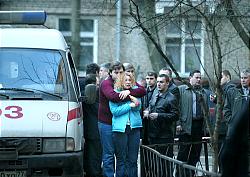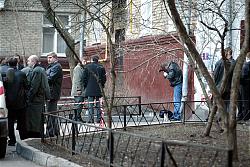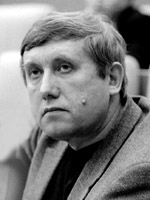 |
Vladimir Filonov / MT
A woman whom neighbors identified as Yushenkov's
daughter Yelena, 19, being comforted near the entryway to
his apartment building in Tushino on Thursday evening. |
Sergei Yushenkov, one of Russia's most prominent liberal opposition
figures and a State Duma deputy, was shot dead in Moscow on Thursday
evening in what fellow deputies condemned as an apparent political
assassination.
Yushenkov, 52, was gunned down at the entrance to his apartment
building in northwestern Moscow just hours after the Justice Ministry
officially registered his Liberal Russia movement as a party.
In his last public comments, a smiling Yushenkov told reporters
in the Duma at 2 p.m. that the "registration has been completed"
and his party hopes to finish third in the upcoming Duma elections.
At 6:40 p.m., an unknown assailant shot him four times in the
back after he got out of his chauffeur-driven car and walked toward
the entrance of the apartment building at 13/2 Ulitsa Svobody.
The assailant then fled, leaving a Makarov pistol equipped with
a silencer behind in what bore the mark of a typical contract
hit, police said.
"Sorry, I can't, I can't. ..." Yushenkov's wife sobbed
when reached on her husband's mobile phone soon after the murder.
At about 8:30 p.m., a young blond woman who neighbors said was
his daughter was permitted inside the cordon that police had set
up around the building. She rushed toward Yushenkov's body, which
was covered with a white sheet, but was intercepted by the young
man who was with her. She sobbed loudly as he drew her out of
the courtyard and drove away.
Yushenkov had bought the apartment, on the fourth floor of the
five-story brick building, only several months before and had
not yet moved in since renovation work was still being done, neighbors
said.
Numbered white markers, apparently showing the locations of the
cartridge shells, were visible between the body and the door to
the apartment building.
A special task force that was quickly set up to investigate the
hit was focusing on Yushenkov's activities as a Duma deputy, chief
city prosecutor Mikhail Avdyukov told reporters at the scene.
He said investigators were also looking into the possibility that
Yushenkov could have been killed over some disagreements in "his
private life" or activities not related to his work at the
Duma. He would not elaborate.
Yushenkov, a co-chairman of Liberal Russia and a member of the
Duma's security committee, had not been involved in any business
activities, unlike some other deputies who have been killed in
recent years, his colleagues said. Yushenkov is the ninth Duma
deputy to be killed in the past nine years. None of the killings
has been solved.
Unlike the prosecutor, city police chief Vladimir Pronin refused
to comment on whether the hit was politically motivated. "No,
we cannot say that. ... All I can say is that a professional did
the work," Pronin said, standing next to the prosecutor as
criminologists continued to examine the murder site.
Investigators also were trying to determine whether the killing
could have been connected to the killing of another Liberal Russia
co-chairman last year. Vladimir Golovlyov, also an independent
Duma deputy, was gunned down in Moscow in August, and his killing
remains unsolved.
Yushenkov had received death threats some time "long ago,"
Liberal Russia's executive secretary Yuly Nesenevich said on television.
He did not elaborate.
Leaders of Liberal Russia immediately described the killing as
a political assassination.
"The murder is purely political in nature. ... I call it
a continuation because Yushenkov is the second Liberal Russia
co-chairman to be murdered," Yuly Rybakov, a prominent member
of Liberal Russia and an independent Duma deputy, said in a telephone
interview from his home in St. Petersburg.
"Liberal Russia has obviously become a bone in the throat
for someone," said Rybakov, who said he had been assaulted
and felt his own life was in danger.
Rybakov alleged that Yushenkov was killed for his efforts to
find evidence to back up allegations that the Federal Security
Service was involved in the apartment bombings that killed some
300 people in 1999. The authorities maintain that the bombings
were ordered by Chechen-based warlords, and several natives of
the North Caucasus have been brought to trial on charges of preparing
and executing the bombings.
Duma Deputy Viktor Pokhmelkin, Yushenkov's co-chairman in Liberal
Russia, said he believes the murder was a political hit aimed
at bringing the liberal opposition "to its knees."
"It is clear that the murder has a political character,"
a visibly shaken Pokhmelkin told reporters who had gathered outside
the police cordon. But he chose not to speculate on who could
have been behind the killing and whether it could have been connected
to the killing of Golovlyov.
The Kremlin press service reacted to the murder by saying that
President Vladimir Putin had been informed and had expressed his
condolences to Yushenkov's family and colleagues. "I am deeply
shaken by the tragic news. ... A man who believed it was his duty
to protect democratic freedoms and ideals is gone," the press
service quoted Putin as saying.
The murder created a furor in the Duma, with most of the factions
and all of the interviewed deputies calling the hit political.
"This is a particular challenge for society because this
murder was committed on the day when Liberal Russia officially
declared the completion of its registration by the Justice Ministry,"
Duma Speaker Gennady Seleznyov said.
 |
Vladimir Filonov / MT
A police investigator photographing the scene
of the killing. The numbers mark the spots where the spent
cartridges were lying |
Yushenkov and Golovlyov walked out of the Union of Right Forces
at its founding congress in May 2001 to set up Liberal Russia after
securing financing from controversial business tycoon Boris Berezovsky.
The party was not officially founded until 2002, only to see the
Justice Ministry turn down its registration bid in July, citing
inconsistencies in its charter.
Back then, Yushenkov blamed the refusal on the Justice Ministry's
unwillingness to see a party affiliated with Berezovsky operate
in Russia. Soon enough, however, Yushenkov fell out with Berezovsky
over the exiled tycoon's pledge to finance the left opposition.
Under Yushenkov's leadership, Liberal Russia's political council
voted 9-4 with four abstentions to expel Berezovsky from the party.
He tried to fight back, securing support from some of Liberal
Russia's provincial branches. This splintered the party, but Yushenkov
managed to solidify his loyalists and win the Justice Ministry's
registration, sidelining Berezovsky.
NTV asked Berezovsky on Thursday evening whether he believed
investigators might want to question him over the murder. "I
would like very much to know who exactly gave the order,"
Berezovsky said. He sought to play down the split in Liberal Russia
and alleged that the Kremlin could have ordered Yushenkov's murder.
In addition to taking pains to set up a viable alternative to
the existing liberal powerhouses of Yabloko and the Union of Right
Forces, Yushenkov also participated in investigating the 1999
apartment bombings. Last year he and his colleagues promoted a
Berezovsky-funded film that alleged that the FSB could have been
involved in the bombings, but no solid evidence has been produced.
 |
MT
Sergei Yushenkov |
Born in 1950 in a village located in what is now the northwestern
Tver region, Yushenkov entered an academy for Soviet military political
instructors in Siberia in 1974. He subsequently pursued an academic
career, teaching Marxist philosophy at the Military Political Academy,
where he rose to the rank of lieutenant colonel and earned a Ph.D.
Yushenkov left his teaching job in 1990 to pursue a political
career as a democrat as the disintegration process gained speed
across the Soviet Union. He was elected to the Supreme Soviet
of the Russian Federation in 1990 and was among the deputies who
resisted the coup attempt by hard-liners in August 1991. He became
known to the general public after persuading a commander of a
tank unit sent by the hard-liners to storm the White House to
switch sides and support defenders of the parliament building
led by Boris Yeltsin.
Yushenkov continued to support Yeltsin in the first few years
of post-Communist Russia, but then fell out with the Kremlin after
the beginning of the war in Chechnya in 1994.
Yushenkov is survived by his wife, daughter Yelena, 19, and son
Alexei, 25.
See also:
the original at
www.themoscowtimes.com
|